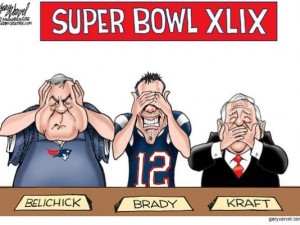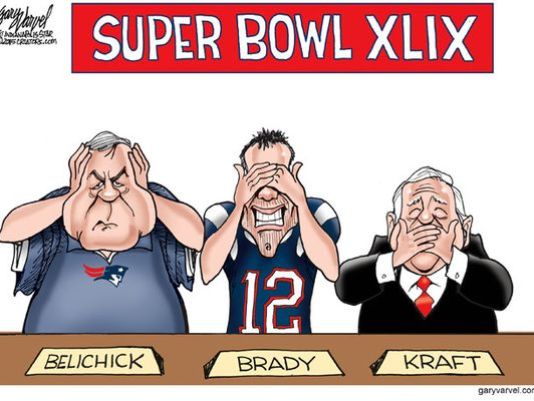Tom Brady’s lawyers convinced a judge this week (9/3/15) to over-rule his four game suspension for using under-inflated footballs in playoff games. This could seem like making a mountain out of a molehill, if it wasn’t so important a statement about bad leadership.
In 1925 golf legend Bobby Jones was playing the U.S. Open when he called a penalty on himself. He claimed that as he moved his club near the ball during his set up he “felt the ball move.” The judges asked the other players if they saw anything which should cause a penalty, and they said no. The judges asked the spectators if they say the ball move, and unanimously everyone said no. So the judges told Mr. Bobby Jones that he need not call a penalty, and he should play on. But Mr. Jones said that he was sure, so he called the penalty on himself.
He lost the U.S. Open by 1 stroke. Had he not called that penalty he would have been in a playoff and may well have won. And that is the kind of thing which creates a legend. Leadership based on honor and ability.
 It strains credulity to think Mr. Brady did not know he was playing with under-inflated footballs. This man has won four Superbowls, and been named most valuable player (MVP) 3 times. He is an athlete in the top 1% of professional football players. He touches the football on every play he is in the game, and he has thrown millions of passes in games and practices over his long career. Yet we are to believe he could not feel that these balls were somehow different?
It strains credulity to think Mr. Brady did not know he was playing with under-inflated footballs. This man has won four Superbowls, and been named most valuable player (MVP) 3 times. He is an athlete in the top 1% of professional football players. He touches the football on every play he is in the game, and he has thrown millions of passes in games and practices over his long career. Yet we are to believe he could not feel that these balls were somehow different?
I am a lousy golfer, not nearly good enough to play in amateur, much less professional, tournaments. Yet even I can tell the difference in a golf ball, which I hit with a 3 foot long stick that has a mallet on the end. Professional golfers can talk eloquently about the feel of a golf ball and how it shapes their shots.
Yet we are to believe that Mr. Brady does not have enough sense of feel in his multi-million dollar hands to notice these balls were under-inflated and thereby easier to control? Few professionals believe he did not know.
Tom Brady had his opportunity to call a penalty on himself, and he did not do it. He could have told his coaches, management or officials that the balls felt soft and this should be checked. But his desire to win kept him from pointing out something minor – but something upon which winning or losing could have turned. Then, when he was caught and it was proven he used under-inflated balls, he had the opportunity to say “this was wrong, and I will accept whatever penalty in hopes that this never happens in professional football again.” But instead he refused to accept his penalty and sued the league.
This is NOT the stuff upon which legends are made.
Mr. Brady is a role model for thousands, possibly millions, of football fans and young aspiring athletes. He had the opportunity to show great leadership. Whether Mr. Jones would have won that U.S. Open or not, he forever showed that athletic leaders should never stoop to cheating. No matter how small. Not only by winning golf tournaments did Mr. Jones become a leader, but by his behavior he demonstrated leadership requires honesty, integrity and trust.
As head of the NFL, Mr. Roger Goodell has used this experience to reinforce the better parts of athletic competition. He tried to demonstrate a commitment to athletic leadership and fairness. He did not ban Mr. Brady from the sport, but rather told him he must sit out 4 games for his error in judgement as a leader. This is not unreasonable, and Mr. Goodell gave Mr. Brady an opportunity to demonstrate leadership, and his own commitment to the principles of good leadership.
Mr. Brady could have used this opportunity to help himself, his teammates, his coaches and everyone who watches sports understand the role of a leader. But instead, he chose to argue for the concept of win at any cost. He will forever be remembered as someone who probably cheated, when perhaps cheating was not even necessary to win. And he will be remembered for promoting to millions of fans and followers that winning at any cost – even if you have to go to court – is more important than demonstrating good leadership.
When leaders think they are beyond punishment, bad things happen. Look at Bernie Ebbers of Worldcom, Dennis Koslowski at Tyco and Jeffrey Skilling at Enron. To them winning was all that mattered. They hurt millions of employees, customers, suppliers and investors with such hubris. They were bad leaders, and bad role models. While Mr. Brady will not go to jail, his role in teaching bad leadership principles is fully entrenched – and likely will affect many more future leaders than the worst American business has thus far produced.

